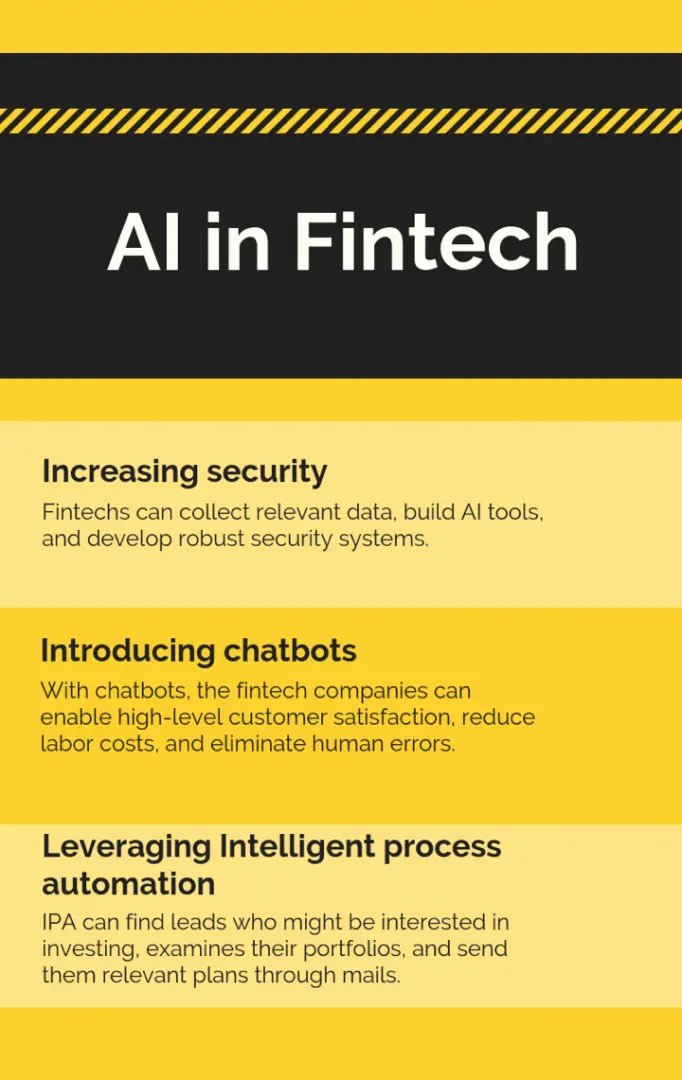Artificial intelligence (AI) is disrupting Fintech by providing personalized wealth management, automated customer support, intelligent financial assistance, fraud detection, accurate decision-making, and so much more.
Most of us think fintech is a relatively new concept. Still remember the days when we had to go to financial advisors for gaining insights on the best investment plan? However, contrary to popular belief, the fintech sector has an old and lengthy history. The history dates back to the 1950s. Since then, the sector has seen unceasing evolution, development, and revolution, which most of us just fail to appreciate. So, here’s a quick recap. In the 1950s, the inception of credit cards relieved people’s stress of carrying currency with them anywhere they go. The next decade saw the birth of Automatic Teller Machines (ATMs). People were able to withdraw or deposit money without visiting or interacting with banks. Then in the 1980s, electronic stock trading was developed. Sellers and buyers who had to meet in person for negotiating stocks were at the positive side. With electronic stock trading, sellers and buyers were able to carry out their trading practices on a single platform. Later in the 1980s, sophisticated record-keeping platforms were developed, which changed the way people stored their data. Also, the concept of online banking was introduced in the very same decade. In the 1990s, the sector saw the rise of websites for internet banking. Thereafter, the millennials era was filled with back-to-back innovation like mobile payments, new-loan algorithms, investing services, and just so much more. And today, fintech has established its place in the digital space of fast-changing technological trends.
As the last 68 years paint a picture of persistent growth, the sector still sees breakthrough technological applications. One such transformation is because of AI. AI brings in incredible possibilities, ranging from customized services to automated customer support to high-level security to cyber threat mitigation and much more.
HOW ARTIFICIAL INTELLIGENCE IS DISRUPTING FINTECH
AI in fintech will help firms to streamline customer service, automate manual jobs, detect frauds. All of this will in turn increase accuracy, boost productivity, and increase a company’s bottom line.
1. Increasing Security and Preventing Fraud
It’s true that technologies bring in high-level convenience, allowing us to make payments in just a few clicks. But unfortunately, this trend opens up a whole new host of security issues. Fraudsters get a fair chance to commit criminal activities. While such a situation will leave customers hugely disappointed, companies will also have to face financial losses. Did you know, as per the report from LexisNexis, “every dollar of fraud costs organizations nearly 2 ½ times more than the actual loss itself.”
Fortunately, AI can solve this issue. We live in a data-driven world. Each minute, each second, data is generated. Data, if interpreted correctly, can uncover potential insights on how fraudsters carry out illegal activities. Also, data can find whether a user is trying to abuse the network or not. Fintechs can collect relevant data, build AI tools, and develop robust security systems. More the data, more the accuracy of the result that the AI tool gives. The fintech firms can collect more relevant data to make the AI tool smarter and intelligent, and give better decisions on security issues.
2. Helping More Customers with Smart Chatbots
With customer expectations going sky high, there is a need for a platform that offers highly customized, quick, and secure solutions. How about having a personal virtual assistant, that is just one message away from us to offering the required financial assistance? Chatbots can fulfill this demand!
Chatbots, a messaging platform, is programmed to answer questions asked by customers in real-time, around the clock. This sophisticated platform can be designed to carry out different roles, ranging from financial advisor to that of an investment manager. Customers can also interact with a chatbot and ask it to make a monetary transaction, without even downloading a mobile app. With chatbots, the fintech companies can enable high-level customer satisfaction, reduce labor costs, and also eliminate human errors.
Also, imagine we are looking out for the best investment plan. Probably, our first move would be asking our family or friends. And to be sure, we would take suggestions from an investment expert. However, affording an advisor might be difficult for the not-so-wealthy people. But, this situation will no longer persist. Why you ask? Because we have chatbots acting as our advisor! By gauging customer's financial profile and goals, chatbots can suggest the best plan for the customer.
3. Providing a Competitive Edge with Intelligent Process Automation
Fintech firms are increasingly escalating the pace of revolution with the help of cutting-edge technologies. They are now looking to combine two incredible technologies to become a differentiator in the competitive market. Robotic process automation (RPA) and AI have become a disruptive force in the fintech sector. Augmenting AI to a rule-based robotic process automation system gives rise to another tool that not only automates tasks but also possesses decision-making capabilities. Yes, you guessed it right. It is Intelligent Process Automation. This newly born tool is expected to add 512 billion dollars to the finance sector, as revealed in the report from Capgemini Digital Transformation Institute.
Robotic process automation tools are programmed to carry out only specific tasks, and so they fall short to process unstructured data. But now with intelligent process automation (IPA), this problem will be solved completely. Intelligent process automation can analyze structured, semi-structured, and unstructured data, learn with time how to undertake different tasks, and take decisions on its own. For example, IPA can comprehend the incoming mails using NLP capabilities and take appropriate action. After reading a mail, it will understand whether the mail is from a potential customer or just spam. If the mail is from a potential customer, it will automatically compose mails for the concerned executives, telling them to contact the lead. Else, it will just send a greet message to the sender. IPA can also find leads who might be interested in investing. It can examine their portfolios, gauge their financial status, and send them best-suited plans through mails. Apart from that, IPA can actually carry out a lot many things such as underwriting, report generation, claim processing, and so much more, with high processing speeds and no errors.
CONCLUSION
In today’s high-paced technology-driven world, fintechs are surpassing their competitors by following the new-age trends that have arisen because of advanced technologies. While these firms have successfully managed to satisfy today’s new generation and their needs, their demands for more convenience and ease will never end. The groundbreaking technology comes as a life-saver for these firms. Even though leveraging AI will take immense efforts and might eat a lot of money, but it will stand poised to revolutionize the financial services, operate smartly, and make better decisions with time. Most of all, investing in AI for fintechs will bring in handsome ROI, mind you!




Leave your comments
Post comment as a guest